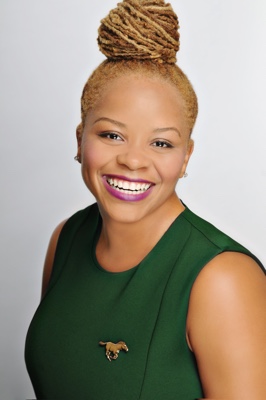What I’m Reading: An Interview With Historian Crystal A. deGregory

Crystal A. deGregory, Ph.D. is the inaugural director of the Atwood Institute for Race, Education, and the Democratic Ideal at Kentucky State University, where she is an associate professor of history. A Phi Beta Kappa graduate of the historic Fisk University, she earned master’s and doctoral degrees in history from Vanderbilt University, and holds an M.Ed. in curriculum and instruction from Tennessee State University.
What books are you reading now?
Tamura Lomax’s Jezebel Unhinged: Loosing the Black Female Body in Religion and Culture; Keisha N. Blain’sSet the World on Fire: Black Nationalist Women and the Global Struggle for Freedom; and David W. Blight’s Frederick Douglass: Prophet of Freedom.
What is your favorite history book?
Cynthia Griggs Fleming’s Soon We Will Not Cry: The Liberation of Ruby Doris Smith Robinson. I still remember being late to a graduate school seminar class because I sat virtually uncontrollably crying in my car just after finishing the book.
Why did you choose history as your career?
I’m certain it’s cliche, but I feel like history chose me. I’ve always had a love for stories—especially those adults were telling. Now, I get to tell stories at the intersection of the challenges to power and privilege.
What qualities do you need to be a historian?
In the process of telling good histories one finds there are many questions asked, some answers that will prove your initial ideas wrong, and numerous challenges to accurately telling histories fairly and respectfully. So a good historian must be very curious, sufficiently gracious, and honestly, a little nosey too.
Who was your favorite history teacher?
I don’t know if I have a favorite history teacher, but the person who taught me the most about loving history was the late Beth Madison Howse, a librarian and fourth-generation Fisk University alumna, who for forty years was caretaker of the university’s Special Collections Library and Archives.
What is your most memorable or rewarding teaching experience?
It is always rewarding to have a student share that you positively changed her or his life. But if I have to recall a singular most memorable moment it would be a handful of months ago, when the hero of the Nashville Waffle House shooting was revealed to be James Shaw, who was my student at Tennessee State University. I have felt no greater pride nor any greater sense of relief than in that moment.
What are your hopes for history as a discipline?
I hope prospective majors—and their parents—view history as offering viable career options, and even more so, as providing pathways to lifelong, impactful work. I hope that the discipline creates opportunities for minorities and women—and offers a seat at the table of power and influence to black women in particular. And finally, I hope the discipline’s ability to inform the present and predict the future continues to command our respect and grows in influence—if not, we’re doomed to repeat the most painful parts of our past.
Do you own any rare history or collectible books? Do you collect artifacts related to history?
I collect Bahamian history books and anything related to historically black college and universities in general, and Fisk University in particular. Any other book I read is subject to my note-taking in its margins—much to the chagrin of my childhood parochial school’s librarian, Sister Eleanor.
What have you found most rewarding and most frustrating about your career?
Student interactions are unquestionably the most rewarding part of my career. Most frustrating are the constraints of a system that generally only considers a handful of pathways as those leading to success. We need more pathways and we need more successes.
How has the study of history changed in the course of your career?
In some ways it has changed a lot; in other ways, it hasn’t changed much at all. The expansion of the digital humanities has created much-needed opportunities for young, minority historians in particular, to develop and share their work. The latter has been a blessing to me and others like me.
What is your favorite history-related saying? Have you come up with your own?
“Stories live forever. Storytellers don’t.” - Patricia Stephens Due
Everyone has a story—make yours matter. - Crystal A. deGregory
What are you doing next?
More reading, more writing, more speaking, and more fighting for a better world.
